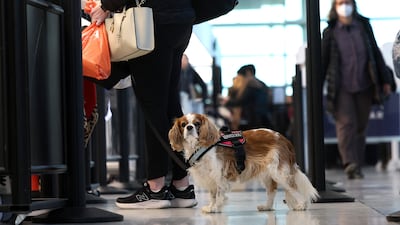Families in the UAE relocating to the US are facing long waits for their paperwork to be approved if they want to take their beloved pet dogs with them, due to strict safety measures in place to guard against rabies.
The Emirates is among more than 100 countries listed as high-risk for dog rabies by the US Centres for Disease Control and Prevention (CDC), despite there not being an existing outbreak in the country.
The UAE has been on the list since July 2021, with updates to the ruling introduced in June.
Currently, dog owners must apply for a CDC Dog Import Permit to take dogs to the US. Dogs should also have a valid rabies vaccination certificate and an ISO-compatible microchip for identification.
The CDC website states that “due to the extremely high volume of permit requests, responses to applications may be delayed up to 8 weeks after submission”.
A statement on the US embassy’s website in the UAE says this temporary action is “necessary to ensure the health and safety of dogs imported into the United States and to protect the public against the reintroduction of dog rabies into the United States.”
About 300 dogs are annually denied entry to the US due to inadequate paperwork, according to CDC data. But during the Covid-19 pandemic, CDC documented an increase in cases of incomplete, inadequate or fraudulent rabies vaccination for dogs, which prompted authorities to tighten measures to protect public health.
Families caught unawares
Janet Robins, an American resident in Dubai, who is currently processing paperwork for her two Golden Retrievers, said it takes up to six weeks or even more to get the permit.
“I got both my dogs here in the UAE and naturally they are vaccinated against rabies here. I applied for a CDC import permit three weeks ago,” said Ms Robins, who works as a project consultant and is returning to the US imminently.
“My dogs also have their rabies blood taken, which is another requirement. My ticket is booked for January 10 and I am really hoping all the permits will come through before that.”

She said she is glad she began planning early. “Otherwise, there is no way I can fly with my dogs. Leaving them behind is not an option,” she added.
Lisa Anderson, an American who recently relocated her dog Dandelion to the US, said the whole process was “quite straightforward” as she followed guidelines on the CDC website.
“The CDC guidelines said to allow six to eight weeks, but we received the permit in two weeks,” Ms Anderson told The National. She said she sought help from the British Vet Hospital in Dubai and they arranged everything, from paperwork to transport of the blood sample.
“Once we arrived at Dulles airport [in Washington DC], Dandelion was delivered to us at the baggage claim and we escorted her through customs.”

Families must plan ahead
Companies specialising in pet relocation said there are still ways to import dogs, even if restrictions have been tightened.
“There is no ban on dogs entering the US. But there is a long list of requirements and families have to plan well in advance if they want to take the dog with them to the US,” Shaila De Araujo, Global Relocations Account Manager at Dubai Kennels and Cattery, said.
She said last year, when the measures were first introduced, many pet owners were caught unawares.
“It caused a lot of panic,” she said.

“There is no reported outbreak of rabies in the UAE in many years. We do not know why the UAE is in the list”, she said.
“Only those dogs that were vaccinated against rabies in the United States by a US-licensed veterinary surgeon could re-enter the US.”
How to apply for a permit
The permit process is “frustrating and time-consuming”, said Ms Araujo, but does allow pet owners to bring their faithful friends with them.
“Dog owners must apply for a CDC Dog Import Permit to bring dogs to the US,” she said. “All dogs must also be at least six months old, have a valid rabies vaccination certificate and have an ISO-compatible microchip for identification.”
If the dog has a US-administered rabies vaccination and is older than six months, they are exempt from the suspension and can enter the US. Expired vaccinations will not be accepted. Also, there is no limit to the number of dogs that can be imported.
If the dog has a foreign vaccination, rules are different depending on the number of dogs being imported, according to the CDC.
In both cases, dogs have to arrive at one of the 18 airports with a CDC quarantine station. Atlanta, Boston, Los Angeles, Miami, San Francisco, Seattle and Washington DC are among the airports that accept dog arrivals.
“If the dog does not have a US-administered vaccination, owners have to personally apply for a CDC Dog Import Permit online and that can take up to six weeks. We have had cases where families have received the approval a few days before their intended date of departure,” said Ms Araujo.
“The dog should also have a valid rabies blood test taken at least 45 days prior to the travel.”
If the dog does not have a CDC dog import permit, it can enter only through one of the four airports with a CDC-approved animal care facility. The dog must have a reservation at an approved animal care facility upon arrival.
“We are importing at least two to three dogs to the US every month. If you plan in advance and adhere to CDC stipulations, it is doable,” Ms Araujo said.


